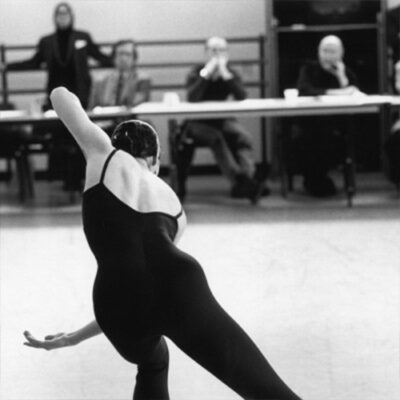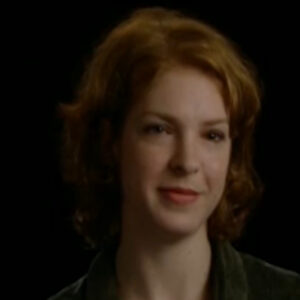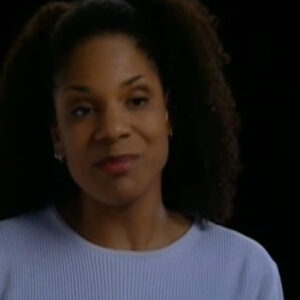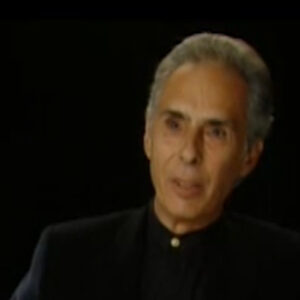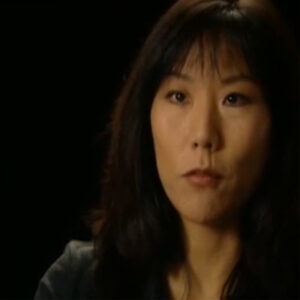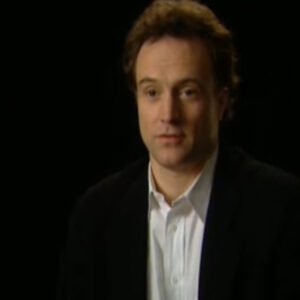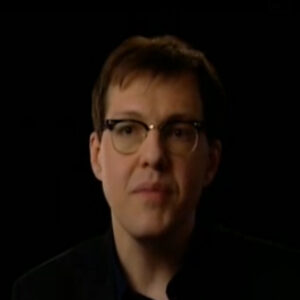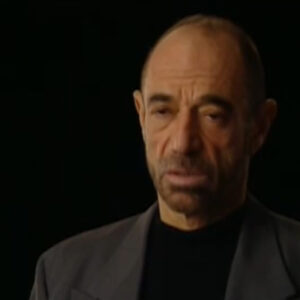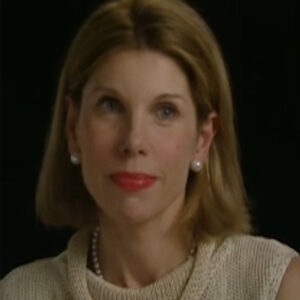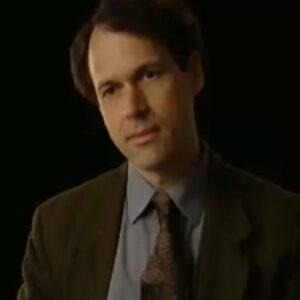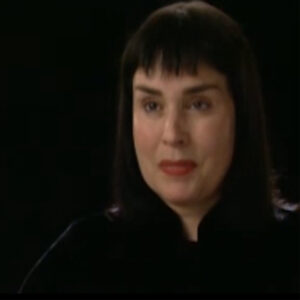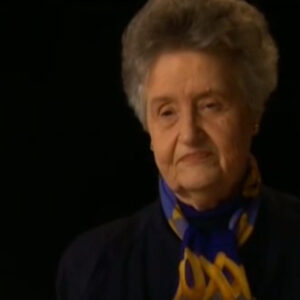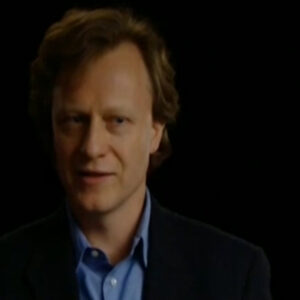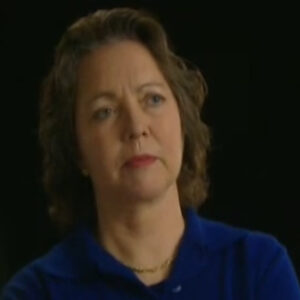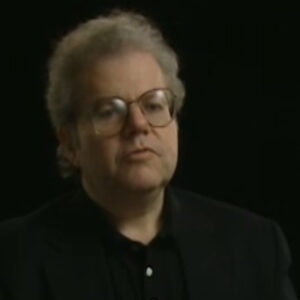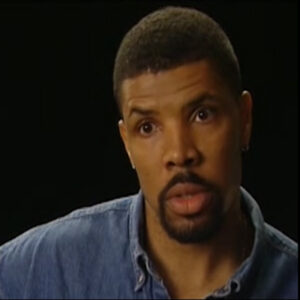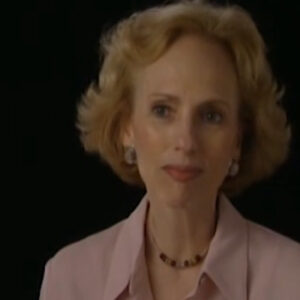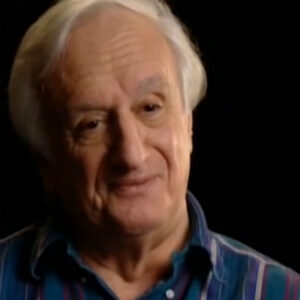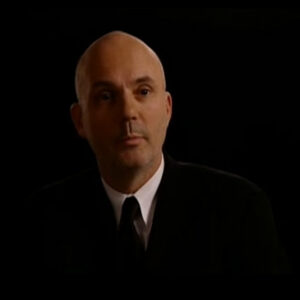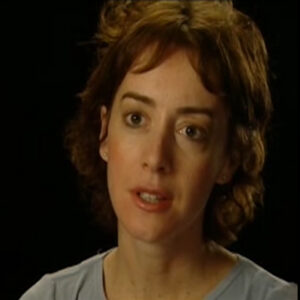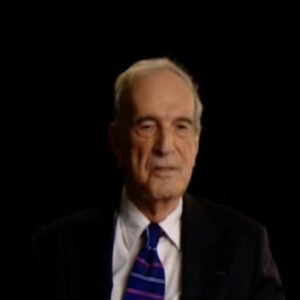Speaker Youngest of four children. You know, I I think of all the actors I’ve ever known. They’re probably proportionately more youngest children who’ve turned out to be actors than than maybe middle children or our oldest children and families. So, you know, you have to do something to stand out. And I think I was bouncing off the walls as a kid and my mom, there was a wonderful community theater in my hometown that had a school and a children’s theater. And there was a production of Life with Father. When I think I was nine and my mom said, you know, do you want to. Would you. Was this interesting to you? Because for some reason after the swim meets that I would swim in my sister and I when we were young. We would go to a pizza parlor afterwards. And I was a big Louis Armstrong fan and somehow found myself on stage with the little Dixieland band at the pizza parlor doing a Louis Armstrong impersonation when I was eight years old. And it’s a source of great embarrassment to me now. But then it was really great. So I think my mother realized that swimming and the other sports I may have been involved in at the time weren’t quite enough. So she asked me if I wanted to go to this audition down at the Dock Street Theater for a production of Life with Father and I. I went down there and I didn’t get cast. One of those things you never let go of. And but I was bitten and I started taking after school classes at that point, which were very they were the theater was run by a man and Emmett Robinson, who had studied at Yale in the thirties and had come back to Charleston with his wife, who was a very gifted playwright. And they ran this theater for, I would say, Emmett in 1988, 40 some odd years. And they ran it like a professional theater. They they they instilled what they would like to call the professional attitude in you. Even though it was a community theater, you were all amateurs, but you weren’t, as he put it, amateurs in that you took your job seriously. And it was a wonderful thing for me as a kid to hang out with all these adults and and to I mean, I don’t think I quite understood what you know about the art of acting at that point. It was probably more just about getting up in front of people and and and, you know, learning my lines and not bumping into the furniture. And. But I. I was it was a world in which I, I felt very grown up and and and very mature. And it was it was really fun, even though I did a lot of children’s theater and played dogs and cats and rats and mice. And, you know, I think the first thing I played was a monkey. And then I graduated to playing Grumpy and production of Snow White and and I did. There was a Prince Charming in there someplace. And and as as the sports, you know, sort of came and went. And school was not something in which I academically excelled. But this was the one thing that I held on to through our high school. And I went to college in my hometown, Charleston, South Carolina, and I ended up going to a big summer work audition, the Southeastern Theatre Conference, where everything from, you know, pageants to theme parks to Shakespeare festivals. Everybody who was looking for young actors for summer work showed up. And you had one minute and I think eight bars of a song. And it was at the Grand Ole Opry Hotel in Nashville with butter sculptures of Dolly Parton in the lobby. And and and I went to this audition and ended up taking a position as an intern at the Alabama Shakespeare Festival, which was in Anniston at that point. And I ended up working with some actors from Juilliard, Michelle Farr, Richard Levine. And they were also teaching some classes and they encouraged me to apply. And and I put all my all my eggs in one basket. Julia was the only place that I applied to because I really Emmet and and Daddy Donna, who ran the children’s theater and the little theater school, and Kit Lyons had instilled in me the love of the theater. And I had, you know, built sets on the weekends and things like that. And after this summer in Alabama, holding spears and torches and, you know, and taking classes and fencing and Taichi and I ended up going to New York and auditioning. And, you know, I don’t know what would have happened if I hadn’t gotten into Group 14, but it it it turned out and and my experience at Juilliard was was really, really wonderful and interesting. What. What do you know about this? Did you know about it sort of history? The legacy of Juilliard is music. You know, I mean. Yeah, well, I knew about John Houseman. I didn’t necessarily know about Santini. I think at that point I knew that it was the most comprehensive actor training for the theater in the country. And I knew it was very prestigious. I’m trying to think of when I first heard about it. And I know that it was before that particular summer when I had worked with some of its graduates. But I can’t quite put my finger on exactly when it, you know, entered my consciousness. But I knew that that’s where I really wanted to be. And and I I thought I remember because I was in college at this point and and doing some plays. And I had actually a friend of mine wrote a one man play and he and I, he directed it and I did it and we did it for five nights. It was very, very educational experience. And. And I knew that at that point it started I started to understand a little bit more about about the craft. I mean, it it had been a gradual process. And I, I, I wanted to. I mean, it was I suppose it’s a little embarrassing to say that that I was hooked into the theater by and by the impulse to show off. But that’s basically, I think, where it came from. And. And then I started to understand what it what it might take to, you know, breathe life into a character and to offer an audience of curious experience and and to move them and to make them laugh. And. And so I I wanted to become that kind of actor. And I knew that Juilliard offered everything under one roof that that, you know, that you could possibly delve into. And so I, you know, worked on the audition as as much as I possibly could. I did a very fraught audition piece from King John Young Arthur, who is about to be. He’s about to have his eyes burned out by his uncle. And and Tim Monarch wrote some funny notes for me after my audition and and about what he thought I said. And I said, no, it’s not the lines. I said, yeah, I understand a word you said. So I. I was fortunate enough. I also did a piece from Long Day’s Journey into Night, and the audition experience was very interesting as well. I had Eve Shapiro, who was a wonderful acting teacher, Steven Aaron and John West, who was a singing teacher on my audition panel. And and, you know, there are parts of your life that you don’t you can’t seem to remember one minute of. And yet that particular day was indelibly burned into my into my psyche. What have you done in the piece through the two pieces for the three of them? Right. Well, we just did it ourselves each year. Panting nervously of the hallway. I know you are. There is no you. You are simply one. I was simply one sort of raw nerve I. I had some friends who had been at Alabama the summer before. I had other friends who were actually students at Juilliard at that point. And I met some people. I met some people who were auditioning. And so there were people to talk to. And I think we were all. I was very nervous. Everybody else seemed to actually be fairly. I mean, I think now I understand that everybody was pretty nervous. But but at that point, I think I felt like I was the only one who was who was really just, you know, shaking in my boots. But I think everybody was. And Michael Kahn ran a warm up that morning for everyone. He took everyone to three or four, which is the room that, you know, end up spending so much time in. And he was extremely reassuring and said, you know, this is this is for you. And I want you I want you to feel as relaxed as you can so that you can do your best work. And he he let us through this sort of fun little improv warm up exercise. And I thought, this is this is going to be a wonderful place. You know, I hope it works. So I went into three or one for my for my first panel. And Steven did. He said he wanted to do the piece from Long Day’s Journey again. And he said, I would you know, I’ve ever been to the Midwest. And I said, no, no, no. And once you start, you’re in the Midwest and. And I want you to I want you to fix an image of a wheat field, just nothing. But we do the horizon. I want you to fix this image in your mind, and I just want the speech to fall out, OK? In your own time when you’re ready. And I started and I thought, I don’t know what I’m doing is what he wants me to be doing, but I’m doing it and doing it and it’s fine. And and then, you know, you spend a couple of hours wondering, you know, that these these three ball three people hold your, you know, educational fate in their hands. And the list went up. And somehow I, I my name was there. So did you end up going up here looking like everyone in the theater? Yeah. And did you end up going up much like. No. No, I went in, I, I did. I don’t I don’t even. The second one is I remember it in private. They gave me to do and I remember they asked me to sing. So I sang Happy Birthday to Juilliard. And a couple of students who were upper classmen at the time told me that they thought it was very funny that I sing Happy Birthday to the school. But I didn’t I had no other clue what to sing. So I just remember sort of, you know, stern faces in in the, you know, beyond the fourth wall. And. And I did did it. And I thought, oh, who knows? Because it didn’t. There’s no feedback. I mean, from the morning session, you had the feedback of at least seeing your name on the list. But after the afternoon. Who knew? So you ultimately came here. What was the mix of your class? Well, that I think my experience there was was as good as it was because of my class. We were fortunate enough. And it’s, you know, it’s it’s a roll of the dice because you never know what kind of mix of personalities. Any particular class is going to be. We were fortunate enough to be a very cohesive group who liked each other. Were, you know, drawn to each other. We socialized a lot. I mean, you almost always do, because there is a you know, you’re you’re you’re together 10, 12, sometimes longer numbers of hours per day. But there was something cohesive about our group that was something that the faculty kept remarking about. We were I, I don’t think that there was you know, there were just. I think we were all there. And who knows what what what it really was the Jews together. But there were other I know other classes that I, I could see where it wasn’t there wasn’t the cohesiveness that we were experiencing. And, you know, part of it’s that you’re it’s a little like, you know, going through four year boot camp, you know, together there’s, you know, some of the experience. I mean, you found teachers who were the best teachers you’d ever see and you found teachers who, you know, may some of their 16 year old students may have been more mature than they were at at moments. So there’s a there’s kind of a there’s safety in numbers, I guess, is what I’m trying to say. And we were you know, there wasn’t without conflict, but but we were a very cohesive group. And we also were a very musical group, as they like to tell us very often. And there were a bunch of very good singers in our class. So we ended up doing a couple of musicals while we were there. And. And there was just something extraordinary about this particular mix of people or. Twenty four of us and 19 of us graduated and. And, you know, even the people who left after the some time, some during the first year, some during the second year and some after the second year, there are people from whom I learned a great deal. I found it interestingly, you know, it was I think I learned at least as much about about acting, about about performance and and about the craft by watching all the very gifted people, not only my class, but but in other classes. While I was there, I learned a great deal from all of them by by watching their work and and even the people who decided it wasn’t the place for them. From my class, I learned a great deal from them while I was watching them work. Is ensemble really, really broke me. Did you feel that they wanted people? Well, you know, it wasn’t somebodies choice, but the school’s choice. Did you? Rebellion. Well, there was a there’s a particularly unique case, I think some of our class were. And as you get toward that that moment when you know that they’re there, you’ve got there’s the possibility of your being not asked back. That the plays that the U. I don’t know exactly if they still do the big checkoff project at the end of the second year now. But that’s what we were doing at that point. And there was a very I was in a production of three sisters and there was a production of Uncle Vanya that the other half of our class were doing, which was a very unhappy production for various reasons. And the basically nobody was really able to do their best work in this production. And and the students in it said, you know, we really don’t want our fate at this school to be judged by the quality of this production. They’ve had some problems with that. That particular director. And and so they they cut a deal basically and said, we refuse to have you cut. Members of the class from this production because its production will not show anyone in in their best light. So the two members of our class who were cut at the end of the year were from the production that I was in. And at that point, we were going to finish with a very large class regardless. And I don’t I don’t think those two people should have been cut. But, you know, it’s a decision that wasn’t up to me. And and I think that we were, I suppose, a you know, we were unique enough group that I think as many of us should have been kept together as far as possible. So classical classical training. What you were in for? It went really well. I. Up until I mean, one of the things that that I remember as a kid indelibly sort of, you know, shaping my moviegoing experience and theatergoing experience was seeing the Zeffirelli, Romeo and Juliet when I was a kid. And it was just it was a really great thing. We went to the drive in and I was, I think, six at the time. And it was, you know, it was a little racy for a six year old. But I remember my mom telling me not to tell anybody at school that I’d seen this, but I was very grateful that she she took me there and we s and my sister was, I think, probably in love with with the Romeo and had the record, which included some of the soliloquies. And and so I listened to it for many years and learned the speeches myself. And I could do a pretty good, you know, Juliet as well as Romeo. And I think the first play that we did, you know, which is now called the Discovery Play, which is to be called the test play, where they throw you into a room with a ladder and, you know, and marry and sell these and you basically do what you know, you’re there to sort of show what kind of work you do in a production from start to finish. And Marion’s extremely caring and and and finesses, I think, in a very responsible way the direction of that particular play. And we were doing Romeo and Juliet, and I’m sure and I actually had, I think, a couple of the scenes and I’m sure that I did basically. Leonard Whiting from the Zeffirelli, Romeo and Juliet, you know, and we were it was just one of those one of those great experiences. I’ll never forget that that particular production. I think it was a three and three quarter hour Romeo and Juliet, which the faculty sort of sat stonily throughout. And we some of the things that I think I did, some of the things that some of the actors did, we we were glad that nobody else saw besides each other and and the faculty. But I had been, you know, intimidated by Shakespeare for a long time, but but had also responded to it somehow. And and the summer that I spent in Alabama holding spears and torches, we did Cymbeline in Romeo and Juliet, two gentlemen of Verona and Tartu, and the importance of being earnest. And I was in all the Shakespeare and not in the end and the other two, but to see the actors, these these real pros working and to see how how rich it was for the actors and how rich it was to to watch. And to listen to when it was done well was a it’s a you know, I think it can be a feast for an audience and certainly a feast for an actor. And so I knew that that was one of the things that I wanted to do. I felt that if you weren’t if if you were an actor without classical training, you weren’t, you know, not that you weren’t really an actor, but you weren’t embracing the tradition in some way. And I’ve I’ve talked to kids, you know, who have called me in the last 10 or 15 years, friends of my families or friends of friends who say I’ve got a daughter or son who really wants to be an actor. And I’ve talked to them and I say, you know what? What is it that you want to do? Do you want to. Do you want to be a theater actor or do you want to be a classical actor? Do you? Well, usually I get the response as something like, well, I really want to do films. And I said, well, then you probably don’t want to go to Juilliard. You probably don’t want to go to a conservatory program because it’s really it’s really, you know, focused on on the classical repertory, you know, and don’t sell it short either. You know, I mean, if you’re gonna sit around waiting to be a movie star, then, you know, that’s not really being an actor in some way. And I think that one of the things I mean, Juilliard also, and I think maybe rightfully so, doesn’t prepare you at all for the business. You know, there’s no there’s no there’s no class on how to pick an agent. There’s no class on how to you know, there’s basically experience in doing a classical repertory, you know, and and and they throw as many things as they can possibly think of that pertain to that at you and see. And I think it’s up to you to to find out what works for you. It’s up to you to figure out what your best way of working is. And I think that for an actor to to miss out on on doing Shakespeare and doing other classical theater, even if it even if it doesn’t turn out to be something that you want to pursue, I think it’s really important that you have the experience and you sort of go through, because I can’t imagine that there be too many actors exposed to that who wouldn’t embrace it at a certain point. I mean, we may we may not all want to do restoration comedy, but there’s certain there’s certain virtues of that kind of work that I think once exposed to someone who is, you know, really an actor and not just wanting to be famous, that it’s it’s a very enriching experience to you personally and and certainly professionally. Do you think there’s a big leap in preparing you? Do you think they are not prepared to do the show to be in a film or do you think. I think you one if you could do this, you can do that. Maybe not just to some extent. Yes, but nothing can prepare you for a professional experience and nothing can prepare you for finding your own way in the professional world. I, I think it took and I’ve heard other Juilliard actors say this, too. I think it took it takes years to sort of shed some of the things. I mean, I, I think you all come out of Juilliard speaking a little like this sometimes. You know, you all I mean, the joke was, you know, the Juilliard actors, you understand everything they say and boys are boring. And Yale actors, you don’t understand anything they say. But it’s fascinating, you know, and it’s not really true. But I think you can always and I’ve heard agents and casting people say this, you can always spot the Juilliard actor, you know, and I think it takes a while for some of that to because you feel some I think you just feel like I’ve you hold onto this technique that you may have learned in the professional world, because you you you haven’t had the experience out there yet. And I it’s a continual learning process. You know, I, I, I guess I had some idea that when I got out of Juilliard, I’d sort of be done with my not with my learning, but with certainly my classroom training. And and, you know, I’ve learned I think at least as much, if not more, since I’ve gotten out and about what works for me, you know, and and I’ve come up with, you know, my own way of. Working, which I think is really important, and and I I don’t think that that’s something that they can necessarily teach you. I think they can just expose you to everything that they do. And there’s a I mean, it’s incredibly comprehensive what what they offer. If you tried to put all those classes together on your own, you know, in the great big world of New York, it would be prohibitively expensive. And you wouldn’t necessarily know, you know, who else to turn to to get the kinds of things, you know, from Alexander to mass class to you know, we had they did actually offer us an honest science class that Rosemary Tischler from the Public Theater taught in our last couple of years, which was very, very interesting and and helpful. But I found I found it a little difficult for a few years to sort of find my find my way. And I had an agent tell me after out of school, she said, you know, we’re in this for the long run with you. If you if you don’t, you know, work steadily, immediately. And I thought, well, no, I want to work steadily, immediately, you know. And I found ways to work steadily and immediately. But I, I, I feel like I’m, you know, hitting my stride now. I haven’t gotten a lot of wonderful experience working. I you know, my first job out of school, I had, I think, a couple of lines and a play. David Hare play that he directed and I also understudied. And it was was wonderful because the people I got to work with and David himself directed it. It was great. So this is a very long, rambling answer. But but I think the the exposure to the classical stuff is is extremely valuable. Exposure to the classical stuff, I think is really important and and it’s not, you know, I guess it’s not for everybody, but in a way it it does. I think it does prepare you for a little bit of everything. I mean, I had never done any Noel Coward at school, but I ended up doing a production of hay fever that Rosemary Harris was starring in. And, you know, Rosie was incredibly helpful to me in in so many ways. She probably didn’t realize just how much she taught me. But but it was you know, that was that was like having a having a master class at school. Just the experience of working with her. And I had people who were working with me at the time on the agent manager side who didn’t quite understand why I wanted to take that particular job. But I you know, it’s the journey. The journey can be very circuitous and very sort of serendipitous. And I think that, you know, finding what is most satisfying to you is the most important element. And for me, it was the classical theater. The one thing that I don’t actually know, of course, you have. Yeah, I love the audience. I mean, why are they pulling out? Well, I mean, you know, I read The Rediscoveries Style and Michelle said any book. And then right as I think we graduated, they there was a book about actor training that that was pulled together from from a lot of his papers. And, you know, it’s the same formula that’s been tried and true in England for many years in the Royal Theatre School in Canada. And and I think in the same sense that the that the music school and the dance department there is the classical repertory. You know, there is you know, the there’s the Greeks and there’s Shakespeare and and there’s you know, there are the great plays, the great, you know, plays that that have stood the test of time and that should be performed and need to be performed. And the act there needs to be. It’s like the the great repertory for the musicians. It needs to be performed. And then Juilliard and the other great, you know, acting schools in the world want to prepare want to train actors to to meet the challenges of those particular plays, which are you know, they’re not the they think they involve being physically fit. They involve, you know, control of your breath and your voice. And they can they involve being able to find ways of unlocking your full expressiveness. They require the use of accents. They, you know, require sometimes the use of masks and and physical techniques. And so I think that what they what they wanted to do was, was throw as many of these kinds of tools that use as they could so that you have the opportunity to to draw on that experience and to know not even that you’ve exhausted that kind of training while you’re there, but that, you know, this is how this is this is these are the roads that you need to go down in order to prepare for this particular role. And in that way, I. I draw on my experience from Juilliard all the time when I’m working. And, you know, I don’t necessarily have to do the full Edith Skinner 30 minute warm up before every sitcom, you know, shoot night that I do. But. But there are other things from that from from other classes that I draw on for, you know, that that are very useful to me in this particular format in which I’m you know, I find myself working these days. You probably don’t want to stay in the dorm after maybe your first year. But it would it it it’s a little overwhelming both to come to New York and and, you know, have to find your own place to live. Then, of course, a lot of our classmates were in touch with each other during the summer to find out what their living arrangements were. And, you know, you need a roommate. You’re looking for a roommate. Maybe we can find a place to share. And I had a place to stand for the first couple of months. And then I was one of my two my classmates. We found a building way uptown, way uptown, one hundred forty ninth in Riverside. And I lived I ended up living that building for five years. But, you know, it was there were wonderful families that lived in the building. But you had to go through a fairly a fairly tough section of town getting off the train and getting to the building. So I lived there, I guess, about a year, maybe a little less than a year, and went into the lobby, my building one night we were doing of Mice and Men and. And Richard Hamburger, who was directing, had us all researching barley farms. And. And so it turned out to be a wonderful production. And so we were all doing our homework on exactly how a barley farm ran.
Speaker And so I had a bunch of books from the library in my backpack, and I had my rent in cash in my wallet, which for some reason on the train, on the way home. And I didn’t normally do this. I took it out of my pants pocket and I put it into a zipper compartment in my backpack. So I got into my building. I saw a guy on the first floor who I knew and I spoke to him, said hello, and this kid, who was a very warm September night, and this kid had his hood up on his sweatshirt. And I thought, it’s a little it’s a little warm for that. But, you know, it’s just one of those thoughts that flashes through your mind. So I got on the elevator. I held the door for him. He got on the elevator with me. And I thought I just. At this moment, this little thought, you know, I think I’ll just wait to push my floor until he gets off the six floors in the building, it’s not going to. But there was something about, you know, there was either something about some sort of vibe, some sort of energy, some paranoia on my part. I don’t know. But I. I hit. He hit six, which was my floor. And he said six. And I said, yeah. And I’d also been out to the grocery store and I’d been out to buy some blinds for my windows that day. So I was laden with stuff. And I looked down the bags and the next thing I knew, there was a gun at my head. And he said, Money, man, money. And I, I said, I, I don’t I don’t have I don’t have anything.
Speaker And it was the first thing that came out of my mouth without even considering it. And I thought, improvisation class don’t fail me now. He said, I’ll blow your head off. And I said, I don’t have a dime. I don’t even have a token. I spent everything that I’ve got on what’s in my bags and I don’t have anything. Please don’t kill me, you know? Please don’t kill me. So this took the time that it took to take just six floors up. And he said upstairs on the roof. And we went up on the roof. And I it couldn’t have been happening.
Speaker It couldn’t be had. It can’t be had. This can’t be happening. This can’t be happening. It’s happening. We got up on the roof. He said, you’ve got to have something. And I said, I’m telling you, I’m a student. I don’t have anything. He said, What’s in the bag? And I said, books. And I flipped open the top and I. I shook the books out on the ground. And I said I was a little hysterical at this point. I said, please don’t kill me. Please don’t shoot me. Please don’t kill me.
Speaker And he had a change of heart at some point. There was a my mom had given me a St. Genesis medal. The patients in the theater that I was wearing and he said is that he said, what’s that around your neck? Is that gold? And I said, it’s silver. You can have it. And he had this change of heart and said, it’s OK, it’s OK. I’m not going to I’m not going to hurt you. I must have the wrong guy. And I had no idea what supposed to mean, but I wasn’t going to ask him. And he left and he said, You’ve never seen me. And I said, no, it’s fine. I never saw you. And I stood on the roof for another ten minutes or so wondering if he was waiting for me at the bottom of the stairs to, you know, rob my apartment. And I.
Speaker I finally made it down the stairs, made it in the apartment. He wasn’t there. And for the next, I guess, I don’t know, couple of months, we were one of the things that we were doing in the play and of Mice and Men was was whittling. And so I took my witling knife with me, my little penknife home in my pocket, my little security blanket to ward off any would be attackers. But yeah, the city raised its head, I guess, statistically speaking. I mean, I lived there for almost 15 years and that was my only bad experience. So I guess everybody has to have one. But, you know, I did finally call the police and they said, you know, we wanted to come down and take a look at some pictures. And I said, I I can describe the gun really well. I have no idea what this guy looked like. So it was it was pretty hairy. And I never told anybody about it. I didn’t want my family to worry and I didn’t know there was no other place to move to. I mean, it was a it was a great deal. This particular apartment. And so I and I ended up living there for for quite a few more years. But but yeah, it was a it was your you know, you’re in the big city now, kid, you know, kind of experience everything pretty well.
Speaker And also the cohesiveness. I mean, you know, we one of the things that’s weird about the building, which they fixed since I was there was, you know, your constituents, you’re you’re a part of the constituency of Lincoln Center. But the door was on sixty six, which was on the far side of Lincoln Center. Everybody entered into the building through Sixty Sixth Street, which was, you know, across the Ralph. I’ll get that right through Sixty Sixth Street, which was on the other, you know, across the way from Lincoln Center. So now they actually have the entrance to the building. They sort of turned it around and you enter from Lincoln Center. So it’s really part of the Lincoln Center experience. But, you know, you never one of the unfortunate parts is you mean you you saw you saw all. I mean, we probably because we’re on the same floor as the dance division, you probably you know, you knew the dance division students better, I think, than you knew any of the musicians. But, you know, you were also intensively engaged in your. No particular discipline that you never really mixed very much.
Speaker You know, I played on the Juilliard tennis team with some friends of mine. There were some courts that we got for free. It’s like 10 o’clock on Sunday night and buried Hastings, who was the orchestra librarian, was the tennis coach.
Speaker And so and I and I knew a tuba player and a couple of violin players who who played on that team. But other than that, there were very few musicians who I really got to know when I was there. I mean, I went to a few concerts and went to see some of the opera productions and and some of the recitals. But I think one of the things that the dorm probably affords now is that there’s the you know, the a little bit more cohesiveness between between the music, dance and drama divisions, you know, even even not really mixing at the time with your kind of a legacy of knowing musicians even more. Oh, yeah. And knowing that these were the best young musicians in the country and, you know, in some respects, maybe some of the best musicians in the world, because you knew that this was a I mean, that was that was one of the two really formidable aspects of it.
Speaker And I think a lot of the kids felt and I was among them, you know, like do I do I really have you know, do they and why do I have what it takes to be here? I mean, is it kind of and I don’t know whether many of the people felt that, but I certainly did, because I I knew that, you know, these were these were kids who who had spent their whole lives preparing to enter the professional world and, you know, as musicians, as dancers, as actors. And it was it was daunting. But at a certain point, you think, well, of course. I mean, I remember asking Michael Kahn, you know, how many people do you audition for the class of a year? Is it a thousand? And he says, yes. I mean, some years it’s that many some years it’s a little less. And I said, how do you whittle it down to 25 people? He said, No, no, no. How do you fill it up, you know? And I thought, wow, that’s wow. That’s really enlightening. I hadn’t really thought of that. And I you know, and it made me feel very.
Speaker I’m happy to be there. It was it.
Speaker Did you feel some sort of living up to the, you know. Quite a few heavy anchors?
Speaker Sure. First, lots of mystery. By the time you got there was heavy.
Speaker Sure. Yeah. And and and yet I even then kind of understood about the the fickle nature of the business.
Speaker I mean, some of the some of the greatest actors around are not on TV or not in movies, you know, and are are putting together very distinguished careers in the regional theaters and off Broadway, off off Broadway and doing experimental theater and things like that. I. So, I mean, you you sort of understand also the cyclical nature of the business. I was most impressed with, you know, the people whose work floored me. I mean, there’s one particular actor who was in his fourth year when I was in my first year, and there was a performance that he gave in a Shakespeare play. That was one of the great things I’ve ever seen. And just sublime, you know, and he has a very, very good career. And and yet he’s not one of the, you know, high profile people necessarily that have come out of school. But. I’ll never forget the performance, you know, and and so there’s a lot that I wouldn’t I just I guess I understood not, you know, that I wouldn’t necessarily want to be intimidated by feeling like I had to live up to some sort of standard that, you know, that was established by someone who was famous, you know. I just at a certain point understood that I really wanted to do the best work that I could. And that’s what also the one of the great things that they did for us while we were there was invite was was get us tickets to see things all the time.
Speaker We got to see everything that was good, bad and indifferent in the theater in New York at the time. And we also were lucky enough to say the cast of Nicole, that Nicholas Nickleby was in town when when we were first year students and we got to see the play, which was it was one hundred dollars a ticket at the point at that point, which was, you know, way beyond any of our means.
Speaker And then the I guess 10 members of 12 members of the cast came and spoke to us for three or four hours. And it was just incredibly exciting and and illuminating to have these people who we had just seen create this incredible, incredible experience in the theatre. Talk to us and encourage us. And and Edward Petherbridge came and actually taught third year class at that point, a master class. And we had I mean, people like Peggy Ashcroft came in and Kevin Kline, who, you know, we sort of he was someone and is someone that we whose work we all respect.
Speaker And and he basically came in and said, you know, I don’t I mean, what do you want to ask me? Because I don’t really know what I can tell you about what you know. But if you have any questions, I’m happy to answer them. And he was great. It was just really wonderful to to have these, you know, these these legends that you had grown up watching in movies.
Speaker And and and, you know, Peter Brook came who I mean, The Empty Space was one of the books that I had read as a as a high school college student that had really excited me about the possibilities of what can happen in theater. And he came and spoken. And, you know, it was just it was amazing.
Speaker It was just the opportunity to, you know, be to be part of, you know, a very exciting world and and also to be contributing to it, you know, or potentially contributing to it.
Speaker Part of that didn’t have a career.
Speaker Right. And make you so visible. Yeah. Because, you know, and what we always come to in that thought is that it’s really about the process. Well, in the dark.
Speaker Well, and it has I mean, in the process that one of the you know, one of the great classes that’s offered there is in the Alexander technique and Judi Liebowitz, who who I was lucky enough to be taught by, you know, took the process of the Alexander technique, which is about examining physical habits.
Speaker Not being necessarily bound, by the way you normally get out of a chair. There is a there is a more efficient way for your body to get out of a chair.
Speaker There’s a more there’s a way to let your body work as it was designed to. And this whole technique was developed by this Australian actor. And then Judy kind of had taken it. And she was quite incredible example, having had polio as a child and and teaching herself to use her body in such a way as to allow hours of the walk unassisted.
Speaker And we she kind of took this technique, which was about allowing your spine to work the way it’s designed to and and is most efficient in its in its in its application to get out of a chair, to walk around a room basically, so that we’re not we’re not walking around like this. We’re not holding all this tension here. It’s it’s it’s all about, you know, providing you the best kind of active relaxation which can allow you to do work as an actor. And she took it and said, you know, you insofar as you make physical choices as an actor, you know, there it presents if you start to look at yourself objectively in this way and show, I would photograph you at the beginning of the year and sort of help. And at the end of the year, you would examine kind of where what what things had changed about you. Next invariably grew, you know, shoulders invariably got broader. You stood up taller. And all of this was, you know, very healthy. And also, it it it started to, you know, help you understand objectively about what kind of choices you could physically make about characters you were playing. But also, she said, you know, the best way to get out of a chair was to be willing not to get out of it.
Speaker And the the idea that that I mean, that that whole way of thinking about process, I mean, it could be applied to any part of your life.
Speaker I mean, and that the idea that you not be hemmed in by habits which are necessarily are not necessarily chosen with any any direction in mind, but it might be arbitrarily chosen are are things to consider. And so, yeah, I mean, the whole. And then I think, you know, the whole idea of process as as it applies to, you know, the bigger picture of one’s life, where it’s all about the journey, it’s the same it’s the same idea, you know, that that it’s it’s not about the result. It’s not about actually standing up. It’s about what you do, you know, to stand up. It’s about how it’s about how you get out of the chair. It’s not about standing up. And that whole idea of process, you know, can be applied to your whole experience there. So whether you whether you get kicked out after your second year, you know, it’s it’s it’s it’s part of your process. It’s part of your journey. It’s part of your life. Or whether you get out of Juilliard and become a movie star, whether you get out of Juilliard and end up doing a classical repertory or whether you get out of Juilliard and find a different path in your life.
Speaker You know, the experience there I think can be, you know, can be found to be a positive experience depending on, you know, how you’re able to incorporate it in you.
Speaker Yeah.
Speaker But what you’re doing now, you know, being, you know, being a situation, I mean, that’s something that you thought you were doing.
Speaker And you sit on it on a show so different from that or is it so different?
Speaker I guess my question is it different is what will make you become, you know, Greg, the very same thing that’s going to make you become Hamlet?
Speaker You know, I would say that.
Speaker I mean, it’s.
Speaker It’s like I mean, the process of working on a sitcom. It’s like doing a 20 minute play every week. And it’s very interesting and very different than any other experience that you are. You know, you have the opportunity over we’ve done 70, I think shows thereabouts right now to work on this character, you know, throughout this arc. And we have a wonderful gang of writers who are very gifted. And, yes, it’s it’s it’s performance, you know, plain and simple. It’s it’s very different, I’d say, than than I had worked on a series that was a single camera drama with no audience. I mean, we get an audience every Friday night. It’s it’s it’s a they’re a little removed from us because, a, their camera’s between us and them. B, you can stop if you need to if you mess up a line or if there’s a technical problem. So you’ve got the safety net.
Speaker So you don’t have the same pure experience of just being an actor relating to an audience. I mean, there’s nothing that replaces the experience of just being onstage and connecting to an audience.
Speaker But I’ve you know, and I, I, I really want to work. I really want to work on things that I find interesting. And I really don’t have I mean, I, I think I avoided certain kinds of jobs when I first got out of school. And I heard William Macy in an interview once say something and he said, I was in a soap opera. And if I was a little depressed and I think I was phoning it in a little bit and I watched somebody else do really, really good work on this soap opera. And he said, you know, and I realized that point, you can do good work anywhere.
Speaker And so I’ve tried to keep that in mind.
Speaker I, I think I mean, when I read that particular quote from him, it did kind of crystallize a few things that I think I’d been thinking about, which was, you know, there is the opportunity to do good work in a little hole in the wall theater, you know, in New York or doing a student film or doing a big budget. You know, sometimes there’s less opportunity to go work in the big budget film because sometimes they they tend to overlook some of the more important aspects of of what makes a film work like a script and things like that.
Speaker But I, I think you can do good work anywhere.
Speaker And and I relish the opportunity to work in as many different kinds of mediums as I can. And and I miss the theater. I haven’t done a play in quite a few years and having an audience every week when we when we shoot our show is it’s it’s it’s a substitute, but it’s not quite the same. It’s not playing Hamlet. But there are opportunities for me to to sort of round out my experience and and do a play in my in my time off. And I got the opportunity to do a bunch of fun movies last summer. And, you know, some of them are there. They’re varied. And I would like to keep the work interesting for me. But, you know, I’m never going to retire. I mean, it’s one of the things that’s nice about about acting is that there are always parks to play, you know, whether it’s Macbeth or Hamlet or King Lear or, you know, or all the parts in between there.
Speaker You can you can always work if you want to. And what I hope for myself is that it continues to be interesting. I, I. When I beat my head against the wall that in either frustration or boredom that I know it’s time to do something else. And, you know, the spontaneity of an actor’s life cuts both ways because you never know. This is the longest job I’ve ever had my life, you know, three and a half years.
Speaker But it’s also it’s nice to to have to have this to work on this character, to work on over a period of time. But, you know, I’ll be ready to move on when it comes to an end.
Speaker And fortunately, we have the time off in the middle to to do those other things that sort of feature we did in front of the L.A. Philharmonic a couple of months ago, just sort of shortened version of the scenes from Midsummer Night’s Dream that Ben Dornberg, who was in his fourth year when I was my first year, directed and just said the words, I mean, David Arkin, Stiers is there. And and and it was just wonderful.
Speaker We and we talked about just getting this classical, you know, classical hiatus theater going. And I actually have a little idea to, you know, to to make. Sure, that all these people who are so gifted and so qualified to bring these place to life and ah, you know, utilizing their gifts in other ways in Hollywood and in New York, get an opportunity to do the work that that, you know.
Speaker That’s really wonderful to do as an actor.
Speaker And I think we’ll hopefully have a chance to do it.
Speaker Usually comes for women.
Speaker Absolutely. Have a baby. You know, it’s absolutely like, OK, I’m in my 30s. Let’s kick in like a job. Right. Right.
Speaker And you know, those things, whether you like it or not, happen concurrently anyway. And so you have to sort of make the best of everything. You know, you kind of. I mean, a lot of people who are so focused on their career, you know, for so many years, I think they they must lose out on some other aspects of their lives. And, you know, my career is very important to me. And so, you know, so is now, you know, raising our son and and enjoying my time at home with my wife and I. My career is in a wonderful place. But, I mean, in some ways, I’ve met actors who who feel like they’re not acting lives have kind of gotten away or they’ve wasted some time in some way.
Speaker But, you know, these things do they do happen concurrently. And I think that, you know, making you’re making your journey interesting is is sort of what you know, what it what it’s got to be about.
Speaker That’s your job, right? Exactly.
Speaker Exactly. And they’ve got to be inseparable, you know, because they you can’t separate. Thanks.
Speaker Great. Thank you so much. I hope it was helpful. Very helpful.
Speaker It’s all a mess. I mean, you know, there were there were times when we all felt, you know, what are we doing here?
Speaker But I mean, there were times when we were all pretty depressed about, you know, about some of our work. But we I think we helped each other.
Speaker That was one of the great things about the cohesiveness of our class without, you know, without these things turning into, you know, encounter sessions. We were all very supportive of each other. And I think that’s what some of the other classes weren’t necessarily lucky to have. And I think for us, we really we were really there for each other, you know, not in all ways, but but in the way that we we all understood because we were all in the same boat, you know, and and there was some recognition of that fact. And we, you know, I think just sticking it out or when it was hard, you know, kind of knowing that we were you know, we were all fighting the same war. We you know, we managed to get through it somehow.
Speaker And the friendships, I mean, they are there’s some of the people I feel closest to. And when we get together, whether it’s been, you know, a couple of weeks or 10 years and and it’s been that, you know, you can you can you can be there.
Speaker You can go right into, you know, that there’s just a kind of emotional connection that you’ve got that that that is one of the great byproducts of of having spent that kind of intensive time together.
Speaker So, like the language of that.
Speaker Exactly. Exactly. And, you know, in the theater, you don’t I mean, you know, if you’re lucky enough to have a long run, it might be a year or two. But that’s really rare. And oftentimes it’s just the summer or, you know, an eight week, you know, four week rehearsal period, four week run or maybe a couple of months of a run. But to have, you know, basically been a company of actors for four years is, you know, you don’t get that in your life very often. I mean, I’m having it right now with this wonderful group of people and working with them.
Speaker But, you know, going through that time when there’s so many things that are stripped away. You you’re so vulnerable. And so, you know, out there and many of these classes sometimes for for good results and sometimes for no result at all. But, you know, there’s definitely a connection that happens, you know, between all of us. And.
Speaker And, you know, I am a group 14 is is, you know, to my dying day will be a group of people that I feel very, very connected to some.

